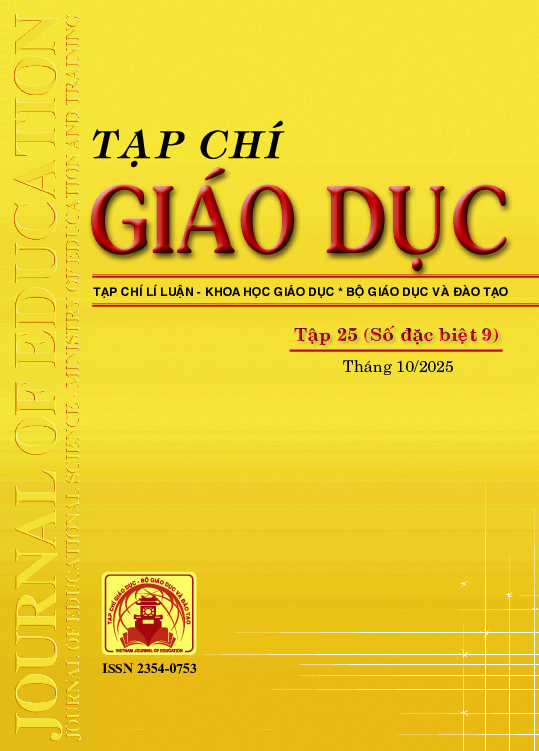Đề xuất khung năng lực ứng dụng trí tuệ nhân tạo (AI) của giáo viên phổ thông
Tóm tắt
In the era of digital transformation, information technology and especially artificial intelligence (AI) are gradually changing the face of education globally. In Vietnam, the application of AI in education is not only an inevitable trend but also considered a potential solution to address existing inequalities in the education system. However, to effectively exploit the potential of AI, teachers need to be fully equipped with the capacity to use and integrate AI into the educational process. Based on clarifying some theoretical issues on the application of AI in education, the role of AI in education, the study proposes a framework of AI application competencies for general teachers in Vietnam in the context of current digital transformation. In the following research directions, we will focus on three aspects, namely: Testing the competence framework in practice at general schools in different regions; Building a standardized assessment tool to measure the level of achievement of teachers' AI application competencies; Investigate the long-term impact of AI competence development on student learning outcomes, engagement, and access to education, especially for disadvantaged groups.
Tài liệu tham khảo
Bộ GD-ĐT (2025). Thông tư số 02/2025/TT-BGDĐT ngày 24/01/2025 quy định Khung năng lực số cho người học.
Boyatzis, R. E. (1982). The competent manager: A model for effective performance. New York: John Wiley & Sons.
Carretero, S., Vuorikari, R., & Punie, Y. (2017). DigComp 2.1: The Digital Competence Framework for Citizens with eight proficiency levels and examples of use. Publications Office of the European Union.
Crompton, H., & Burke, D. (2023). Artificial Intelligence in higher education: The state of the field. International Journal of Educational Technology in Higher Education, 20(22).
Dumont, H., & Ready, D. D. (2023). On the promise of personalized learning for educational equity. Science of Learning, 8(14).
Hồ Mạnh Tùng, Ngô Thị Việt Hà (2023). Công bằng trong giáo dục trước ảnh hưởng của trí tuệ nhân tạo. Tạp chí Thông tin và Truyền thông, 11, 122-128.
Holmes, W., Bialik, M., & Fadel, C. (2019). Artificial Intelligence in Education: Promises and Implications for Teaching and Learning. Center for Curriculum Redesign.
Knox, J., Wang, Y., & Gallagher, M. (2019). Artificial Intelligence and Inclusive Education: Speculative Futures and Emerging Practices (Artificial Intelligence and Inclusive Education). Springer. https://doi.org/10.1007/978-981-13-8161-4
Luckin, R., Holmes, W., Griffiths, M., & Forcier, L. B. (2016). Intelligence Unleashed: An Argument for AI in Education. Pearson Education.
Nguyen, T. Q. T., & Phan, T. T. (2024). The Role of AI in Improving Student Learning Outcomes: Evidence in Vietnam. International Journal of Multidisciplinary Research and Analysis, 7(6).
Porayska-Pomsta, K., & Kaśka, H. (2022). The Ethics of Artificial Intelligence in Education: Practices, Challenges, and Debates. New York: Routledge.
UNESCO (2021). AI competency framework for teachers. Paris: United Nations Educational, Scientific.
Zhu, H., Sun, Y., & Yang, J. (2025). Towards responsible artificial intelligence in education: a systematic review on identifying and mitigating ethical risks. Humanities and Social Sciences Communications, 12(01).
Đã Xuất bản
Cách trích dẫn
Số
Chuyên mục
Giấy phép

Tác phẩm này được cấp phép theo Ghi nhận tác giả của Creative Commons Giấy phép quốc tế 4.0 .












